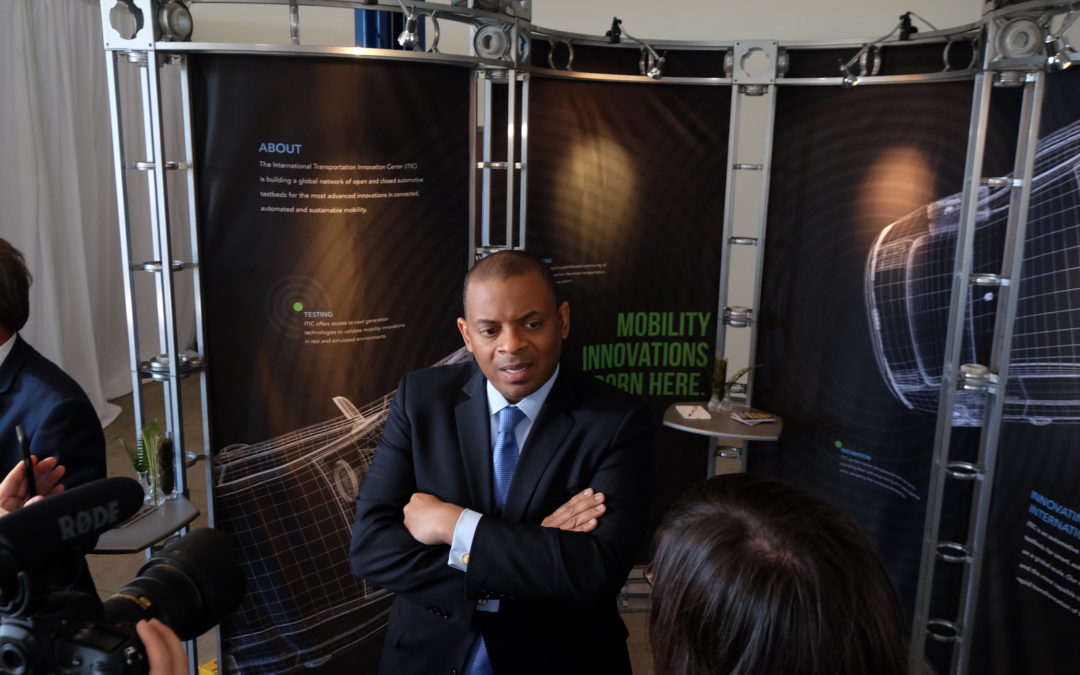September 30, 2016
One week after releasing the nation’s first official Automated Vehicle (AV) Policy, U.S. Transportation Secretary Anthony R. Foxx visited the International Transportation Innovation Center (ITIC) in Greenville, S.C. where he looked under the hood of some of the most advanced R&D projects underway for vehicle automation, road safety, and electric vehicles. Technology demonstrations Sec. Foxx observed ranged from sensor-based roadside safety systems to in-motion wireless power transfer supported by a cybersecure DSRC (Dedicated Short Range Communication)-based infrastructure. The demonstrations were orchestrated by ITIC Chief Technology Officer Dr. Joachim Taiber and supported by BMW, Cisco, Duke Energy, Mobileye, Oakridge National Laboratory, Proterra and Toyota. Other event partners included SK Telecom and SmartTruck and Club Car.
“We are at the cusp of one of the most dramatic transformations in the history of transportation,” Foxx said. “When it comes to the future of technology, our policy leaves plenty of room for leadership to come in and help us continue to raise the bar on safety. It’s exhilarating to see what’s happening here at ITIC and in other places like Detroit and Silicon Valley.”
Headquartered in Greenville, S.C., ITIC operates as a neutral, non-profit provider of innovation, testing and testbed development services for automotive technology R&D. During his visit there, the Secretary addressed an audience of more than 125 invited guests representing leading automotive OEMs, suppliers, global technology providers, federal, state and local elected officials, and other business leaders. He focused his remarks on the four major points of the AV Policy his department issued last week.
Other featured speakers included Bob Irwin, Executive Director of The Seaside Institute; Carol Hernandez, Lead Industry Solutions Architect for Advanced Cloud Innovation at IBM; and Dr. Joachim Taiber, Chief Technology Officer at ITIC. Together, they shared details of a major new urban open test bed project underway in the Florida Panhandle called the 30A Mobility Project. Under the direction of The Seaside Institute and ITIC, the 30A Mobility Project is aimed at developing multi-modal, sustainable and advanced transportation solutions to reduce severe traffic and parking congestion along the 30A corridor in Walton County, Florida.
“The innovations we’re developing for multi-modal, on-demand automated and sustainable transportation systems are in current demand for smart city environments all over the world,” said ITIC’s Dr. Taiber. “The team we have pulled together for the 30A Mobility Project includes some of the most innovative thinkers in the world and has the potential to develop solutions to some of the most complex transportation challenges.”
Following a luncheon, guests were treated to a number of technology demonstrations situated along one of ITIC’s many test tracks. Demonstrations included those previously noted as well as an electro-hydraulic hybrid system for the Class 5-8 Truck market; a long-haul trailer aerodynamic efficiency solution, intelligent intersections; and test rides on electric buses, scooters and bicycles.
Event partners included SK Telecom, which is working with ITIC to develop and market quantum cryptographic technology in the U.S., and SmartTrucks. Club Car provided golf carts to transport guests to and from demonstrations.
